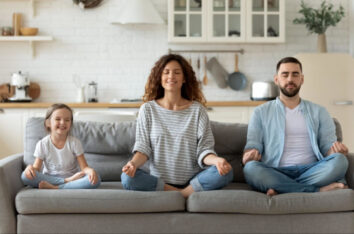The hard reality of today’s world is that finding peace and calmness in our chaotic life is a real challenge nowadays. Balancing work, social obligations, giving enough time to family, and being true to ourselves can be exhausting. Individuals all around the world are facing anxiety and depression due to difficult and challenging life experiences. This is where mindfulness meditation helps to overcome negative sentiments and boost energy. Meditation may take as little as ten minutes but the after-effects are profound. Regular meditation during everyday schedules can give individuals the space to relax their minds and body at a considerable rate.
The benefits of meditation, therefore, extend beyond relaxation. As a matter of fact, regular meditation has been proved to reduce anxiety, depression, and multiple other health conditions. Be it physical, mental, emotional, or spiritual, meditation focuses on all the aspects of a human’s health.
But what’s the best part of meditation?
Well, to be honest, it’s completely safe and has no side effects. It can fit into an everyday schedule and give individuals enough space to relax their mind and body.
What Is Guided Meditation?
Guided meditation is a type of meditation that is described or led by a teacher or a meditator. It can be led in person, in an audio or a video. Guided meditation is guided by an expert that tells you about the basics of meditation.
Having an expert guide individuals through the fundamentals of meditation is a good idea when you are just getting started. Regardless of what we are trying to learn in life, having a trusted and relatable teacher is essential. However, when it comes to understanding the complexities and subtleties of the mind, it is not just important but essential.
First and foremost, before beginning a trip that will last a lifetime, we should be clear about our goals for meditating. First, students learn about the contents of the mind as well as how to approach various exercises in order to get the most out of their meditation. After that, individuals learn how to actually meditate in order to improve their skills. Learning how to incorporate the serenity and clarity gained during meditation into daily life is the next step.
There are many different types of guided meditations, and each has its own benefits. Meditation techniques might also be explained by the instructor. They may also go over how to apply these approaches in the real world experiences.

Guided meditation in this blog is a mindfulness exercise which helps to release stress and depression and generate feelings of compassion, calmness and kindness.
Here is a small “written” guided meditation example.
- Let's begin by settling the body into a comfortable position.
- Make sure you sit with your hands resting on the side of your knees or on your lap
- Now, we are going to take three deep breaths
- With the first inhale, allow the positivity of the environment enter your body
- Exhale any negativity that may have filled your body
- With the second inhale, allow optimism to enter into your body
- Exhale any pessimism that may be piled up
- With the third inhale, relax all your body muscles
- Exhale any tension felt in the muscles
Benefits of Guided & Unguided Meditation
Both guided and unguided meditation have been shown to provide numerous mental and physical health advantages. Meditation can modify the physical structures of the brain, according to general meditation and mindfulness research. Meditation practitioners also report lower stress and anxiety levels, as well as depression and chronic pain. Consistent meditators with sleep problems may sleep better and have greater immune function. A research conducted with the United States Marine Corps found that practicing meditation can help them be more focused on the battlefield.
Another research revealed that guided digital meditation can be just as helpful as in person meditation programs. Individuals who often opted for meditation courses reported considerable improvements in their well being and stress related to jobs. Building a consistent meditation habit becomes easier for certain people when meditation courses are available at a greater level.
How Mindfulness Meditation Helps Reduce Stress & Anxiety
Meditation is associated with a number of misconceptions, one of which is that it entails “emptying the mind” or finding a way to escape from thoughts or concepts. The truth is that thinking is inextricably linked to the mind’s nature. The ability is to take a step back and perceive thinking more clearly without being engrossed in the mental chatter. We may never be able to change our thoughts, but we can alter our perceptions of them. We can also learn to live through our thoughts and not be disturbed by them.
Mindfulness cultivates an awareness of the present moment when we meditate. We are teaching the mind to better comprehend how and why we think and feel the way we do. Mainly, with the goal of profoundly altering our everyday experience and perspective.
Multiple studies have shown that meditation can help with depression. It enables people to cope with the stresses of everyday life and improve their overall well-being. Mindfulness also allows people to become more aware of and accepting of their own inner state. Whether the people are stressed or anxious, mindfulness brings them peace and allows them to be themselves. In a 1992 study published in the American Journal of Psychiatry, mindfulness was found to reduce the symptoms of anxiety and panic attacks significantly and effectively.
Conclusion
Stress anxiety and depression have been hindering people from performing their everyday tasks at a massive level. People opt for many ways to reduce the intensity of what they go through when having such disorders. There are both positive and negative solutions to these circumstances. Negative solutions such as drugs, alcohol and aggressive behavior. Positive solutions such as meditation courses, yoga, rehabilitation centers, and therapy. But obviously, negative solutions have to be overcome and individuals may need additional therapy to overcome such inclinations.
On the other hand, positive solutions just provide individuals the betterment to cope with vulnerable thoughts, stress, anxiety and depression in all circumstances. What we think by far is the best solution.
Read more: Meditation Practices to Increase Mobility and Well-being



